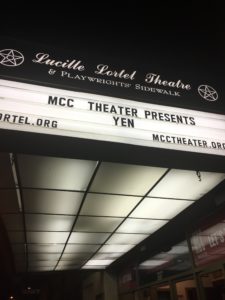Lynn Nottage’s Sweat is beginning its previews in a few days. This is play is a must-see as it explains like no other artistic work Trump America. I think it is so important that I saw it for its off-Broadway run at the Public and purchased tickets for the Broadway run. I will post a more complete analysis after I see it again, but for now my advice is this: go see this play.
Raoul Peck Has Made a Work of Essential Viewing
Let me just get this out of my system at the top: I Am Not Your Negro, Raoul Peck’s exemplary documentary on James Baldwin, was robbed at the Oscars. In the interest of full disclosure, I didn’t see the OJ documentary, and now I really don’t want to. I think OJ mania may tell us a lot about our media-saturated culture, James Baldwin’s life, work, and vision speaks to the entirety of American culture, history, and society. Peck brings that vision to the fore and expertly demonstrates how Baldwin’s analysis of American life, which he developed in the Civil Rights Era, still has application in our post-Ferguson time.
Baldwin famously states, “The great force of history comes from the fact that we carry it within us, are unconsciously controlled by it in many ways, and history is literally present in all that we do.” In a nation that infamously “forgets” its past — how few of my students know when Pearl Harbor occurred — Baldwin is fierce in his argument (rightly) that the history of slavery and Jim Crow still is very much part of our present. This tenant serves as Peck’s thesis.
The film builds upon Baldwin’s notes for a planned but never completed book Remember This House. It rests on a three-legged stool of Baldwin’s friendships with three very different but significant figures: Medgar Evers, Malcolm X, and Martin Luther King, Jr. Another important relationship touched upon is his friendship with Raisin in the Sun playwright Lorraine Hansberry. Peck and Baldwin both are emphasizing the importance and synthesis of culture to politics. Baldwin again cogitates on the line between witness and actor (as in someone engaged in political activity); it is a blurred but fine line. And what emerges is how necessary Baldwin was to our changing perceptions during the 1950’s and 1960’s. As much as it was about bus seats and votes and marches, it was also about where those not white fit into the culture. Speaking of a John Wayne Western, the writer has the epiphany that he was the Indians.
I was struck by a clip from The Dick Caveat Show. Baldwin is joined by a saged academic from Yale University (a philosopher I believe). This professor challenges Baldwin on race, but invoking class! Doesn’t Baldwin have more in common with a white author than a black sharecropper? Firstly, I was amazed that this man would use class prejudice as a way of mitigating racial prejudice. Secondly, he — a learned and educated man — fails to grasp the truth in front of him in 1968: race is class.
Peck masterfully employs a large dose of Baldwin’s cultural criticism — particularly as race has been portrayed in American film — as part of his narrative. Why? Because legislative achievements are one thing, but that history Baldwin speaks of lives on in our attitudes and perceptions. It is present.
Samuel L. Jackson reads a number of Baldwin’s letters and essays. I knew going in that he was doing that, but still, I did not recognize — what is his usually distinct — voice. Jackson’s work adds to the power of the documentary.
I found the film so essential that it has inspired me to create a course exclusively on James Baldwin for my university.
Mardi Gras with Kermit Ruffins
Just a quick aside —
I had the opportunity to see Kermit Ruffins (performer and musical contributor to David Simon’s Treme) at The Blue Note in New York City. He was joined for three numbers by The Sleeping Giant, James Winfield. Just a reminder — a fun one! — of the importance of allowing New Orleans culture to live and breath and continue to contribute its distinct and vital voice to the American conversation.
Broadway Gets Treated to One More August Wilson Premiere
It comes something as a shock that August Wilson’s Jitney has just now made it to Broadway. The play has a complicated history first premiering in 1982 at the Allegheny Rep and, then after extensive rewrites, at the Pittsburgh Public Theater in 1996. It did not make it to New York until 2000 with a production at Second Stage. Congratulations to the Manhattan Theatre Club for bringing it to the Great White Way.
Though a part of the Pittsburgh Cycle, it is not as fully a realized piece in a socio-political sense as, say, The Piano Lesson (which is perhaps the jewel in the crown of the cycle). Further, the concluding two scenes feel rushed. Nonetheless, the play has many pleasures and shares with Fences a strong foundation of American theatrical realism.
The greatest gift Jitney offers is the final scene of Act One. Wow. Booster (Brandon J. Dirden) has just been released from prison, where he had been incarcerated for murder. After twenty years, there is a reunion between him and his father Becker (John Douglas Thompson). And they go at, tearing into each other, each blaming the other for the death (apparently passive suicide) of Booster’s mother. Recrimination builds upon recrimination. Hurt builds upon hurt. A bitter history of a family is encapsulated in the space of fifteen minutes. Hegel said that tragedy is the opposition of two rights; that is played out here in two great howls of pain. It is brutal, glorious, devastating, honest at the most fundamental human level. It is achieves the heights of O’Neill at his best. (At intermission, I kept flashing back to the Roundabout’s production of A Long Day’s Journey into Night).
Dirden and Thompson give as startling and unvarnished performance as any that can be found on Broadway right now. Other performances captivate as well. André Holland, who did a lot with his few minutes of screen time as Andrew Young in Selma, captures the weariness and hope of Vietnam veteran Youngblood. Michael Potts make the most of the complicated Turnbo – a blowhard, but not without positive qualities – and Keith Randolph Smith invests his Doub with equal measures of humor and wisdom. Director Ruben Santiago-Hudson keeps the direction of the two-hander scenes – the heart and soul of the play – crisp and energized. This was an ensemble cast that listened.
Jitney occupies an unusual place in the cycle as does the 1970’s in African-American history. It is kind of a pause between the Civil Rights Movement (and the decades leading up to that movement) and the paradox of the 1980’s and beyond. The world is shifting beyond the characters are not sure what it is shifting to, and that creates an air of uncertainty for characters and audience alike. The city wants to close down the jitney station for rezoning purposes, but what does this mean exactly. It feels a bit like complaining about Shakespeare’s use of pirates as a deus ex machina in Hamlet, but Wilson himself seems unsure here. Becker’s promise to fight city hall dissipates quickly because of his death due to an industrial accident. The concluding moment where the torch is passed to Booster feels unearned. It is the uncertainty a flaw or a design? It is not clear. Nonetheless, Jitney earns its place in the canon. Like the best American plays, it dramatizes in no uncertain terms the searing pain and heartache of family.
Shakespeare and the 2016 Election
Time to do a little catch-up work. The 2016 election was — to put it mildly — a clusterfuck of epic proportions. There were two Shakespeare productions that were playing in New York City at the end of the year, however, that really went quite far in encapsulating where we are as a global society.
The first was Red Bull Theater’s Coriolanus. The play is ready made for our current moment. The tension between autocratic rulers and a restless and mercurial population speaks volumes about a disillusioned people who simply want to blow things up. Director Martin Sexton was both true to his source and true to the world outside the theater’s doors with his depiction of the titular hero soliciting for votes in Rome. Perhaps most prophetically about the work is that Coriolanus finds more in common with Aufidius, the leader of Rome’s enemy, rather than with his own people. Patrick Page, who is fast becoming one of my favorite New York actors (his work in Hadestown and Deaf West’s Spring Awakening was vital), was excellent in the role of Menenius.
The other production that captivated me was, of course, New York Theater Workshop’s rendering of Othello. Of course, stars Daniel Craig (Iago) and David Oyelowo (Othello) garnered most of the attention, but they were just two components in an superlative and successful ensemble. (I can’t remember the last time I so enjoyed a Roderigo — thanks to Matthew Maher.) Director Sam Gold moved the play forward to a modern military barracks somewhere overseas. While there was nothing particularly new about this choice — the National in London had made a similar choice a couple of years ago — the exploration of character is what truly marked this Othello as one for the ages.
The over-arching question of the play is the why. Why does Iago go after Othello with such a blind fury of revenge? Iago offers a few red herrings along the way, but none of those are particularly believable. For the aforementioned National production, Rory Kinnear presented an Iago who was just a bloke simply bored out of his mind.
Craig’s choice was far more active. His Iago was one of white entitlement and resentment. Not only did that crystallize the production but sent it screaming through the night like a runaway freight train (in a good way). The caveat here is resounding. That white resentment, let loose, will destroy everything before it — even the whole wide world.
For any who don’t think Shakespeare is relevant (I’m looking at your Ira Glass), these two productions more than prove them wrong.
Who, or What, is John?
I saw Annie Baker’s John at the Arden Theater in Philadelphia on my 50th birthday. This was perhaps not the best choice as the play, deep in Joseph Campbell territory, trades in the primordial forces lurking just beyond the veneer of civilization. It is The Bacchae kept at bay, a Lovecraft story except not, a connection with a past both unexplained and inexplicable.
The Arden production, overseen by director Matthew Decker, gets the creep just right. This is not as easy as it may first seem because the play also interweaves elements of a yuppie relationship gone sour story coupled with a fish-out-water story. Jenny (Jing Xu) and Elias (Kevin Meehan) check into a Gettysburg B&B run by Mertis (Nancy Boykin). The set-up here is that this dysfunctional city couple – that can neither quite stay together not can quite break up – will receive salt-of-the-wisdom from the good country folk and find some sort of happy medium in their relationship. That by play’s end they are as dysfunctional if not more so as the play began is one example of Baker’s strengths in playing with expectations and genre.
The real pleasure of the play, though, is how it touches on the elemental of earth, humanity, and life itself. The operative word here is “touches”, almost like a cold breeze on the back of the neck. Nothing is explicit or overwhelming, but one always feels that there is something sinister just beyond the forced cheer of the B&B’s décor. The history of the house (a make-shift field hospital during the famous battle), the utilization of birds and dolls (totems) as compelling images, the strange language Mertis and her friend Genevieve speak, and the sense of female power that harkens back to Maenads of legend places the orderly world we perceive on very shaky ground indeed.
MVP Carla Belver portrays the role of Genevieve, originally assayed by Lois Smith at the Signature Theater’s production in New York City. Though Genevieve has the shortest stage time of any of four characters, she is the thematic glue that holds the play together. Belver admirably keeps the audience guessing about Genevieve. Is she touched? By mental illness or the supernatural? We simply do not know. Her monologue concerning her descent into madness and the power of her husband John over here captivates. That a John also crops up in Jenny’s life just deepens the mystery. Not who is John but what? That this question – like so many in the play – is left unanswered may be initially frustrating, but should ultimately be satisfied as the play’s very structure becomes a part of the cosmic uncertainty it is dramatizing.
Baker’s work is very challenging requiring precision and complex engagement from cast and director alike. I was heartened to see that her play survives and thrives beyond its initial production.
Another Glass Menagerie?
I am having a hard time getting excited by the prospect of the Sally Fields Menagerie. I feel like I saw the perfect interpretation with ART’s production of the play with Cherry Jones and Zachary Quinto a few years back. Happy to be proven wrong here.
Yen is a Play of Tragic Devastation
I have a confession to make. I have a weakness for British social realism plays. Give me council housing, East London accents, over-consumption of Tango and Smirnoff Ice, and I’m in Heaven.
Anna Jordan’s Yen – currently playing at Lucille Lortel and produced by MCC – fits perfectly in my wheelhouse. Like all such plays that share DNA with John Osborne’s Look Back in Anger, Yen chronicles the hard poverty that a not insignificant percentage of Britain’s urban population. What sets it apart, though, is a that it is just a socio-economic investigation but a moral indictment as well.
Teenager half-brothers Hench (Lucas Hedges of Manchester on the Sea) and Bobbie (Justice Smith from The Get Down) live alone in a desolate flat with only one t-shirt to share between them. They take care of – in the loosest sense of the term – Taliban, their German shepherd. Their mother Maggie (Ari Graynor) has buggered off to live with a new boyfriend. Into their lives wanders Jennifer, or Yen (Stefanie LaVie Owen), newly arrived from Wales. She tries to bring care and human affection to the boys and the dog. At first, she seems to have a positive effect on their lives, but inevitably it all goes terribly wrong and damaged people become even more (physically and emotionally) damaged.
Jordan’s work is unique for several reasons. First, sudden care after years of, well, not abuse necessarily but certainly neglect does not automatically create a positive trajectory toward reassimiliation into society. It is just as likely to create divisions, misunderstandings, and even rage. Second, both brothers are troubled to some degree or another, though Bobbie more so. They do not have the language to express their state of being. Even as Bobbie gets swept up by the Crown’s judicial system, Hench is still left hanging without a clear path to something, anything better. When he seeks out Yen at the end of the play, after all the pain she has had to endure, he desperately needs to tell her something. In an American play, this would result in a beautiful monologue where the damaged hero would tell a story that would crystallize his self-awareness and lead him down the road of recovery and redemption. Not so here. His monologue is a tangle of words and images that distills nothing. Brilliant. Third, Maggie realizes that she has failed as a mother as she sits with Bobbie at the end of the play, but in the same moment, she also realizes that she does not possess the tools to be a better mother. Progress perhaps, but only measured in millimeters.
And that leads to the new terrain Jordan treads. Yes, conditions in council housing, or projects, are bad. That is easily agreed. Here is where she pierces the heart. It is already too late, she seems to be saying. For teenagers like Hench and Bobbie, they are already past saving. It is not enough to try and salvage a bad situation. It is a moral imperative not to let that bad situation occur in the first place or there will be no escape generation after generation.
The acting is exceptional. Owen is both a tough and vulnerable Yen. Graynor is both comic and tragic, monstrous and despairing in equal measure. It catches one unaware, but her journey over the course of the play is immense and organic. Smith and Hedges both play against their more famous screen personas. Smith successfully rides the roller coaster of volatile emotions and maturity. Hedges — who has been carving a niche for himself in indie film working with such directors as Wes Anderson, Terry Gilliam, and Kenneth Lonergan – proves he has the chops to be one of our country’s great actors in the Philip Seymour Hoffman/Michael Shannon vein. His silences are filled with a wounded intensity, his line readings underscored by emotional complexity, and his sense of character revelatory.
For American audiences used to closure and the conclusion of their dramas, Yen is not always easy, but ultimately that is what makes it such a rewarding and necessary evening of theatre.
A Tempest for Our Not So Brave New World
Better late than never. Alas, because of the political maelstrom in which we find ourselves, I can only respond to the production on a personal level.
On Friday night, January 20, 2017, I had the opportunity to see Donmar Warehouse’s production of William Shakespeare’s The Tempest at St. Ann’s Warehouse in Brooklyn. Beyond being an exemplary production of the Bard’s final play, it also provided a much-needed salve for my devastated soul.

Earlier that day, I had gone to the #ArtSpeaks teach-in at the Museum of Modern Art as he who shall not be named was being sworn in. The institution’s conversation about how culture can affect positive political change was uplifting, though I found myself nearly breaking down into tears. It was Phyllida Lloyd’s insightful production and the cabaret that followed that got me back on my feet.
Much has already been written on Lloyd’s deployment of an all-female cast (for this and two other Shakespeare plays: Julius Caesar and Henry IV, Part I) or setting the play in a women’s play. I must confess that I did not see the previous two works, but I found this Tempest to be staggering. Of course, Harriet Walter owned Prospero, but plaudits must be extended to the entire cast including Jane Anouka as transcendent Ariel, Sophie Stanton as a chav Caliban, and Karen Dunbar as a very Scottish Trinculo. The prison setting added a great deal to the play, as the story of The Tempest was an escape from the monotony and cold harshness of their daily existence. Lloyd revels in the magical possibilities of the play with a calypso rendition of “full fathom five” and an eerily gorgeous dance between Miranda and Ferdinand.
Walter is, of course, front-and-center through most of the proceedings. Unlike most of her male counterparts, she found the vulnerability beneath the sternness of Prospero. The most surprising – and welcome – moment can be attributed to Walter and Lloyd’s putting the utmost focus on Shakespeare’s ideas of mercy and forgiveness. Often a throw-away moment in other Tempests, Prospero forgiving Antonio served as a much-needed catharsis. That the prisoner – Hannah – who plays Prospero must continue her imprisonment (for apparently IRA-related activity) while all her compatriots find their freedom provides an elegiac coda to the whole proceeding; having her lie on a cot while reading Margaret Atwood’s Hag-Seed was a nice meta-touch.
After performing for two hours without intermission, the cast then performed a cabaret in the lobby. How they found the energy, I know not. It was a powerful continuation of the thematic trajectory of the production. Music and comedy created a sense of community between audience and actors. But the highlight belonged to Walter again who read Shakespeare’s monologue from The Book of Thomas More when More stops a mob from doing violence against refugees. “This is the strangers’ case/ And this your mountainish inhumanity.” As I said, salve for the soul.
Danger and Revolution: Ike Holter’s Exit Strategy
W.E.B. Du Bois once wrote, “For education among all kinds of men always has had, and always will have, an element of danger and revolution, of dissatisfaction and discontent.” That statement could serve as the epigraph of Ike Holter’s startling new drama Exit Strategy currently in previews at The Cherry Lane Theatre (co-produced by Primary Stages and the Philadelphia Theatre Company). This new work dramatizes the crisis in American education with a voice of anger tempered with compassion.

Holter is working in a similar vein to David Simon (The Wire, Treme, Show Me a Hero) in exploring the gritty reality of local politics and local corruption. The focus here is on one school on the Southside of Chicago that faces closure at the end of the school year because it is falling apart, because it has disastrous test scores, because the land is worth more than the building. At first, the faculty is bitter and resentful but ultimately passive. It takes the audacious act of a student to force them into action and to take the fight to City Hall. The resulting protest resounds with the power of the forgotten and marginalized to make those in power to take notice. Alas, like Simon, Holter eschews pollanyish endings.
Exit Strategy critiques the current socio-political state on a number of levels. First, and most obviously, there is the dissection of the indifference of City Hall to the needs of its constituents, at least its constituents who are not white or not wealthy. Second, the play serves as an expose of the current crisis in American education. There are excellent schools, just as there are excellent doctors. But if you don’t have the coin to pay for them, you are never going to receive their benefits; we can see the slow construction of a society stratified by class with the boundaries drawn by access to education. Third and finally, though, it is an attack on the indifference and apathy that seemingly infects every corner of the nation. Teachers and administrators go through the motions even though those motions are costing people their jobs, their dignity, their future.
All of which makes Exit Strategy sound didactic, which it is not. The script crackles and moves with a fleetness of foot and dark humor of individuals facing impossible odds. Essentially Holter has done what the 1980’s film Teachers was supposed to do: offer audiences a raw agitprop investigation of urban education. In this, the playwright is ably assisted by director Kip Fagan and some of the tightest ensemble acting I have seen on the New York stage in years.
Deirdre Madigan commands attention in the play’s opening scene as a teacher whose raw hostility masks a far more generous heart. Brandon J. Pierce is brings the right mixture of cockiness, anger, and immaturity to Donnie, the student who inspires the small revolution to life. Michael Cullen, Aimé Donna Kelly, Rey Lucas, and Christina Nieves occupy the spectrum of apathy and disgust that is any faculty lounge. The lynchpin is Ryan Spahn whose Ricky is the assistant principal; the various odious tasks that come down from City Hall often fall upon his shoulders. Ricky is a complicated character: an essentially nice guy with a good heart who feels that he has no choice to be the hatchet man until the scales fall from his eyes. His transformation from spineless bureaucrat to the leader of the protest is nuanced and organic. We witness a man find his own sense of moral worth. Kudos too to Holter for his decision that in making Ricky gay his sexuality became just one facet of his character not the overall defining feature of his character.
If I have one complaint about Exit Strategy it is this: it is too short. Usually it is the opposite problem, but Holter has built so much — and there journey here is long and complicated with a number of set-backs — that he needs to allow it to breathe more. Further, his characters have such interesting full lives that we want to spend more time with them. For instance, Ricky’s relationship with Rey Lucas’s Luce is rarely touched, but when it does, seems to be one of missed opportunities and two good people failing to connect and communicate with one another. Like so much else, I wish they had given more exploration. But if you left your audience wanting more, I suppose that could be classified as a good problem.
Holter’s play is ultimately a tragedy of America. Again, to quote Du Bois, “Either America will destroy ignorance or ignorance will destroy the United States.” In Exit Strategy, ignorance alas wins, but it does get a fight.
[Note: This performance this writer saw as a preview performance.]



